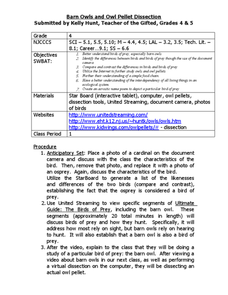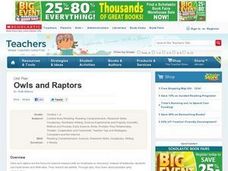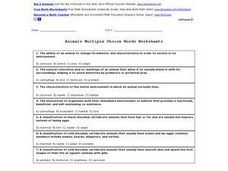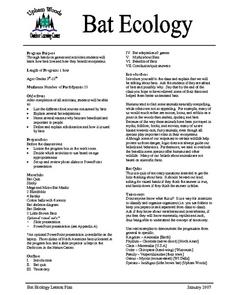WindWise Education
What is Wind Power's Risk to Birds?
How is risk determined? Through the use of a reading passage, individuals or groups learn about bird interactions with man made structures along with wind turbines. Pupils use information from the second reading passage to conduct an...
Curated OER
Barn Owls and Owl Pellet Dissection
Learners explore birds of prey and food chains. In this ecosystems and birds of prey cross curriculum science and literacy lesson, students brainstorm characteristics of birds after viewing photographs. Learners view a video and document...
Conserve Wildlife Foundation of New Jersey
The Great Peregrine Scavenger Hunt - On the Internet
The story of one bird provides valuable insight into general animal behaviors and interactions. Young researchers investigate the peregrine falcon using a web search. They analyze the behaviors of the raptor including its migration...
Curated OER
Dissecting Owl Pellets
Students dissect owl pellets. For this dissecting owl pellets lesson, students discuss birds of prey and make predictions about what they may find during the investigation. Students tease out skull and bones and try to make a complete...
Curated OER
Birds: Wetlands Ecosystems
In this birds worksheet, students click on the links to learn about the birds of the Wetlands and answer short answer questions about it. Students complete 7 questions total.
National Wildlife Federation
Penguin Fun Facts
What's black and white and can dive up to 1,800 feet under water? That's right, penguins! Learn this and many other amazing facts about these unique birds with this handy reference sheet.
Curated OER
Amazing Bird Adaptions--Why Am I A Bird?
Fourth graders identify and classify birds found in Illinois. Using the internet, they discover how birds have adapted over time and how the adaptations have increased their life span. They compare and contrast the various adaptations...
Curated OER
Spiders Catch Prey
Students see that spiders catch and eat their prey and are also caught and eaten by their enemies. They sort the pictures into animals that spiders eat, those they do not eat, and those that are spiders.
Berkshire Museum
Camouflage!: Collecting Data and Concealing Color
Help young scholars see the important role camouflage plays in the survival of animals with a fun science lesson plan. Starting with an outdoor activity, children take on the role of hungry birds as they search for worms represented by...
Curated OER
The Great Winged Adventure
Students identify characteristics of birds, name several species, and explain how birds fly. They make nests and give bird presentations.
Curated OER
Owls and Raptors
Students investigate the predator-prey relationship of owls and raptors. They examine a variety of resources about owls and raptors, develop a list of vocabulary words, dissect owl pellets and identify what owls eat, and play a...
Curated OER
What is a Raptor?
Students explore, analyze and discover the characteristics of raptors and generate a word bank for owls and raptors. They identify attributes shared by raptors and practice various key vocabulary words to master and utilize in sentence...
University of Kentucky
The Great Spider Debate
Poor, misunderstood spiders! They are feared, disrespected, and detested by many people, yet they do so many positive things. A great addition to any insect unit, learn about some of the more common spiders, while hopefully dispelling...
Curated OER
Animals Multiple Choice Words Worksheet
Looking for some simple multiple-choice questions for an upcoming biology unit on animals? This worksheet features 7 clearly worded questions, each with 4 possible answers. Topics include adaptation, camouflage, ecosystems, animal...
Curated OER
Can You Adapt?
Using the Montana State Quarter, learners engage in activities designed to help increase their understanding about how animals must change their social and physical behaviors in order to adapt to their environment. Excellent worksheets...
Curated OER
Illustrated Beauty
Students examine images and inscriptions on Idaho quarter reverse, discuss peregrine falcon's importance to state of Idaho, read and research about peregrine falcon to gather information, and create picture book about falcon.
Curated OER
Focus on Food Chains
Third graders collect and analyze data about food chains. They conduct Internet research about the habitat of a selected organism, write a narrative, and create a computer slideshow using Kid Pix computer software that illustrates the...
Curated OER
Bat Ecology
Young scholars, through hands on games and activities, discover how bats live and how bats benefit ecosystems. They play a game designed to show them how echolocation works and another to show how mother bats locate their young through...
Curated OER
Sea Level and the Terrapin
Young scholars study the habitat of the terrapin. In this terrapin lesson, students create a diorama of the habitat of the terrapin. Young scholars also simulate how it would look if people moved into the area and how predators can...
Curated OER
Poetry To My Ears
Students investigate the 50 States Quarters Program. They use the state of Idaho as a basis for creating context for the lesson. The image on the coin becomes the subject. They differentiate between the reverse and obverse side of the...
Curated OER
Discovering Owls
Students are introduced to different types of owls and owl pellets. They list several adaptations that benefit the owls. Students identify the various species of owl that live in Wisconsin. Students discuss owl pellets and identify the...
Curated OER
Brillant, Beautiful Bats!
Students use the internet to gather information on bats. They write their own bat poem and describe the differences between the parts of a bat's body. They identify how bats are important to humans and how they control the insect...
Curated OER
Land Associations
Students identify and explore life forms of various biomes, define transitional regions, examine effects of abiotic and biotic interactions, research a biome, and produce newspaper that features environmental information. Lessons all on...
Curated OER
Poisonous Spiders! Reading Comprehension
For this reading comprehension worksheet, students read a passage about poisonous spiders before answering 10 fill in the blank questions. They demonstrate their reading comprehension through their answers.

























